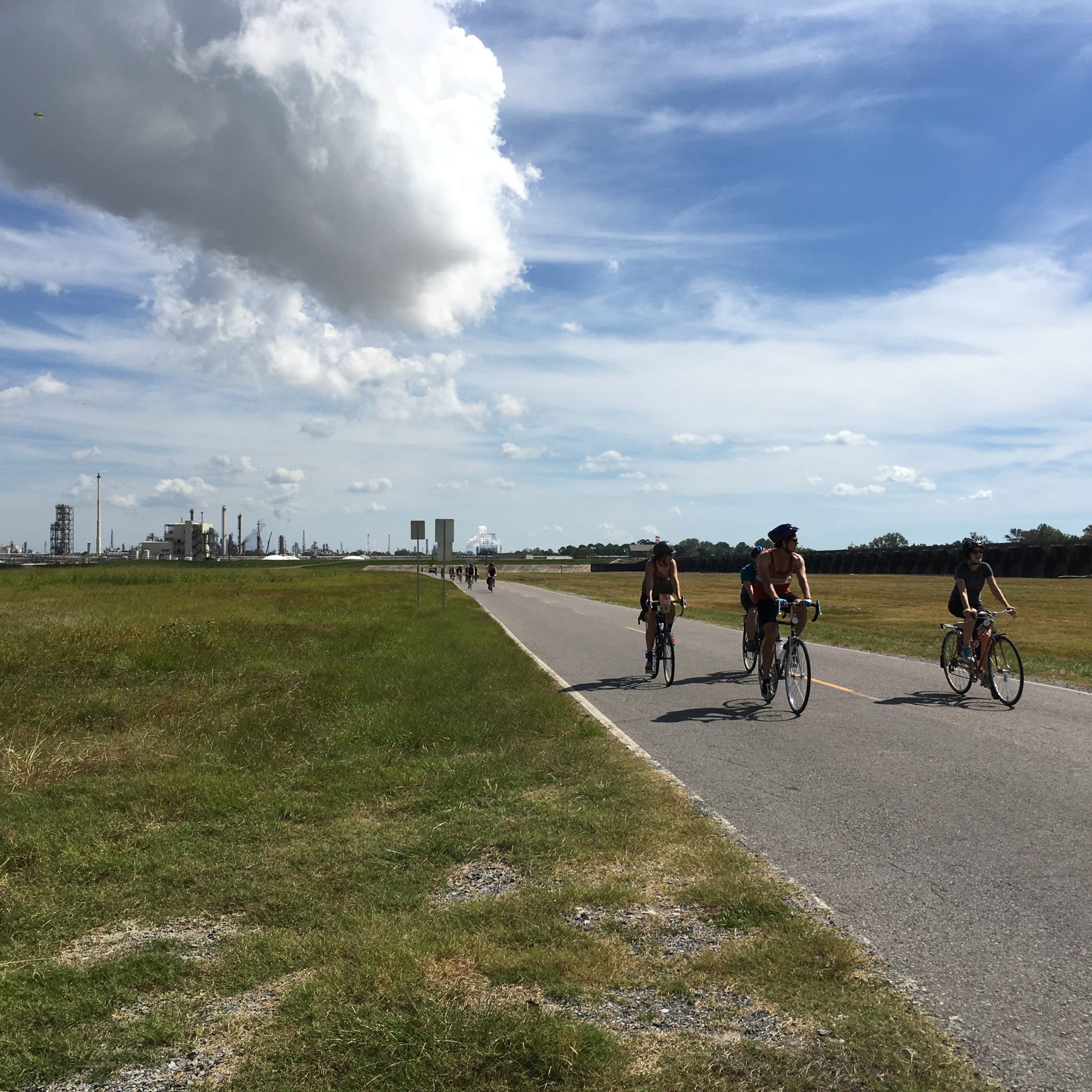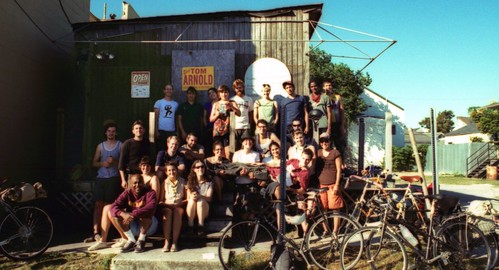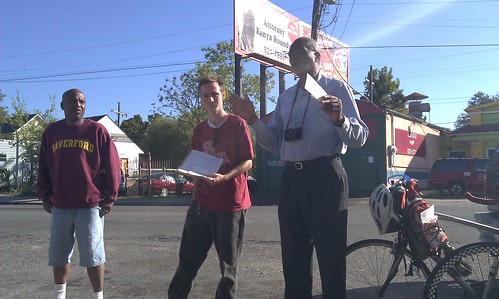This route focuses on prison justice organizations working in New Orleans and Louisiana, alongside historical sites of carceral injustice in the city. These stops are meant to highlight the many ways that incarceration affects individuals, families, and those doing the work to fight the prison industrial complex.
NOLA to Angola aims to connect with, partner with and uplift the work of these important organizations. We would love to hear your input about other organizations and their efforts: leave a comment below!
To start off this route, take a few minutes to watch this video by the Equal Justice Initiative which talks about the history of slavery and the modern day slavery of the carceral system.
Turn by turn directions can be found here: https://goo.gl/maps/SyuPFMiK3rwpmQAV8
Stop A: Old Carrollton Courthouse
The Carrollton courthouse was also the site of a legal decision that could only possibly be seen as progressive in the context of the antebellum United States: in 1858, Judge Burthe heard the case Joseph Tom v. The Slave Ernest, in which Tom sued for the right to seize Ernest and sell him to pay for expenses Tom had incurred while (forcibly, since Ernest was not free to leave) keeping Ernest in his home from the time Ernest was five until he was ten. Tom asked Judge Burthe to declare Ernest as a piece of property, but Judge Burthe rejected that argument and wrote in his judgement “Slaves are persons, not things, and cannot therefore be seized provisionally. It is therefore ordered adjudged and decreed that the writ of provisional seizure be set aside at plaintiffs’ costs.” Despite appeals to higher courts, Joseph Tom was unable to convince even Louisiana authorities of the justness of his desire to treat a child as a thing to be seized and sold. Make no mistake though: the legal decisions in the various suits all supported the larger institution of slavery, whatever marginal weight they may have given to Ernest’s obvious personhood. In that sense, Tom v. Ernest shares a dubious place in United States legal history with other manifestly unjust decisions as Dred Scott v. Sanford and Homer A. Plessy v. Ferguson.
Stop B: Orleans Parish Prison
OPPRC’s mission: The Orleans Parish Prison Reform Coalition (OPPRC) is a diverse, grassroots coalition of individuals and organizations from across New Orleans who have come together to shrink the size of the jail and improve the conditions of confinement for those held in detention in Orleans Parish. Founded in 2004, OPPRC members include community activists, lawyers, service providers, organizers, formerly incarcerated people, and their family members. https://opprcnola.org
VOTE’s mission: VOTE is a grassroots organization founded and run by formerly incarcerated people (FIP), our families and our allies. We are dedicated to restoring the full human and civil rights of those most impacted by the criminal (in)justice system. Together we have the experiences, expertise and power to improve public safety in Louisiana and beyond without relying on mass incarceration. https://www.vote-nola.org
Stop C: Ubuntu Village
As they move through Ubuntu, families and youth gain job skills, feel more confident in their ability to navigate systems in their lives including the courts, address the harm inflicted by institutionalized violence, support each other, and eventually become leaders in their communities. Ubuntu operates under a harm reduction model in which we acknowledge the reality of participants’ lives and the very serious choices they face. We prioritize providing immediate economic opportunities to participants and families as well as developing strategies for long-term economic sustainability. https://ubuntuvillagenola.org
Stop D: The Cabildo
Stop E: The Promise of Justice Initiative
Stop F: Resurrection After Exoneration
Despite that and other setbacks, JT became a resolute advocate for exonerees and for broader criminal justice reform. He was unsparing in his criticism of prosecutorial misconduct and judicial complicity in the harshness of the Louisiana justice system. However, he was an equally loud voice calling for defense attorneys to work in concert with their clients, to advocate against both the everyday indignities of the prison and courts, and to fight for a more fair and balanced court system. In addition to his work, JT was a warm and loving friend, father, husband, and co-worker, and a fountain of energy and new ideas. Among the projects which would not exist without his inspiration is this one, NOLA to Angola, which was created after co-founder Matt Toups heard JT speak. Matt began gathering friends and collaborators, and ten years later NTA is still growing and changing.
JT died in 2017. In his memory, Matt wrote to a group of riders and NTA organizers to honor JT, his work, and his friendship to each of us as individuals and a fledgling organization:
JT’s words in “Voices of Innocence” were the catalyst for our small group of young folks who tried to make a difference with a wacky idea years ago: to ride our bikes to the infamous remote state prison at Angola, in order to support folks on the inside and their families struggling on the outside of this enormous monster of a prison system in our state. The idea for the ride was born immediately after hearing him speak at Loyola University.
It is fitting that he joined us at the very first NOLA to Angola send-off on St. Bernard Avenue on October 14, 2011 in front of RAE. I hope we can all remember that day with pride and acknowledge that, like so many things he touched, it would have never happened without his courage and inspiration. Scott Eustis recorded the moment: (JT can be seen in the maroon “Haverford” sweatshirt)
As for Kyle Duncan, the attorney who argued against JT at the Supreme Court and won a judgment that stripped JT of the money he deserved for the injustice against him? Well: he is a Donald Trump-appointed judge for the Federal Fifth circuit, and actively working to undermine abortion access, among other activities. [That first link is to an editorial by Laverne Thompson, JT’s wife. Go read it!]
Stop G: Louisiana Center For Children’s Rights
Stop H: Women With a Vision
Stop I: Orleans Public Defenders
Stop J: First 72+
Rising Foundations/First 72+ VIDEO + PITCH from NOVAC on Vimeo.
While you are riding, bring masks and hand sanitizer, respect physical distancing, and make sure that you have an emergency contact who knows where you are and can pick you up if needed. We also have some more in-depth tips for safe biking in the pandemic, check them out! Please be aware that NOLA to Angola cannot provide logistical or emergency support to individual riders this year. Take care, and safe riding!


